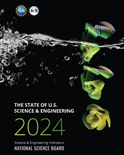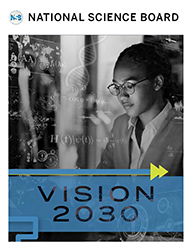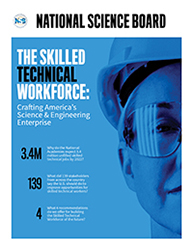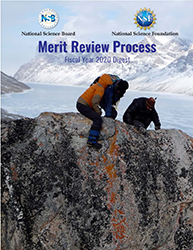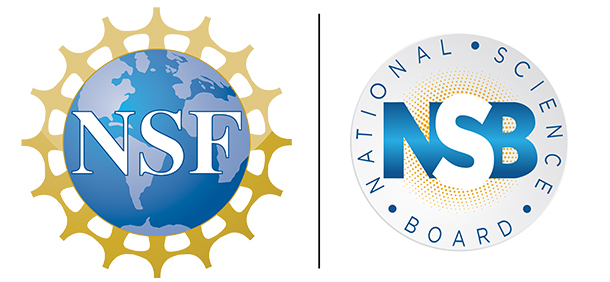
Framing Black Experiences in Science and Engineering
National Science Board will host panel discussion during July meeting

Panelists from left to right: Alexander, DeLoatch, Jackson, Mack, Page (Credit and Larger Version)
July 24, 2020
The number of Black people obtaining STEM degrees and occupations has increased over the last two decades, but they remain underrepresented in the nation’s science and engineering (S&E) enterprise. The National Science Board (NSB) estimates that the number of African Americans in the S&E workforce must more than double to be representative of Black people in the U.S. population in 2030. As the governing board of the National Science Foundation (NSF) and steward of the U.S. S&E enterprise, the NSB believes that diversity, equity, and inclusion are essential to our country’s health, security, and prosperity and that we must address the “missing millions” of American talent.
On July 29, 2020, during the NSB meeting, the Board will host a panel of speakers to discuss the experiences of Black people in S&E.
The event is free, open to the public, and available via YouTube.
Topics will include:
• How can the U.S. develop a more diverse and equitable S&E enterprise?
• What are the ramifications of marginalizing Black people in STEM?
• What are the systemic barriers to entry, retention, and advancement in STEM fields, and how can we remove them?
The panel discussion will accompany a presentation on NSF’s work with America’s Historically Black Colleges and Universities (HBCUs) and is a continuation of the NSB’s statement on racism in S&E and priorities in NSB’s Vision 2030 report.
What: Framing Black Experiences in Science & Engineering Panel Discussion
When: Wednesday, July 29, 2020,12:20 - 1:35 p.m. EDT
Where: https://youtu.be/3CXXjWbwsYE (NSF staff must disconnect from VPN/VDI to access)
Who:
|
Moderator: |
|
|
Victor McCrary |
NSB Vice Chair and Vice President for Research and Graduate Programs and Professor of Chemistry, University of the District of Columbia |
|
Panelists: |
|
|
William Jackson |
Distinguished Research and Emeritus Professor of Chemistry, UC-Davis |
|
Stephon Alexander |
Professor of Physics, Brown University and President of the National Society of Black Physicists |
|
Stephani Page |
Community Engagement Manager, ADVANCE Resource and Coordination Network and Creator of #BlackAndSTEM |
|
Kelly Mack |
VP for Undergraduate STEM Education and Executive Director of Project Kaleidoscope, Association of American Colleges and Universities |
|
Eugene DeLoatch |
Dean Emeritus of Engineering, Morgan State University |
The live-streamed panel discussion will be recorded and available for later viewing.
Panelist biographies:
WILLIAM JACKSON
Dr. Jackson was born and raised in Birmingham, AL in a neighborhood known as “Dynamite Hill”, in reference to an area frequently targeted by the Ku Klux Klan during the Civil Rights Movement. After graduating Morehouse College and earning his PhD at Catholic University of America, Dr. Jackson worked in the National Bureau of Standards (now the National Institute of Standards and Technology (NIST)) and NASA’s Goddard Space Flight Center. He eventually returned to academia, becoming Full Professor of Chemistry and Physics at Howard University before moving to University of California, Davis in 1985, where he remains today as a Distinguished Research and Emeritus Professor of Chemistry. Dr. Jackson’s research areas include Laser chemistry, laser photochemistry, and cometary astrochemistry. In 1973, Dr. Jackson became a founding member of the National Organization for the Professional Advancement of Black Chemists and Chemical Engineers (NOBCChE). Dr. Jackson’s Congressional testimony in 1976 led to the creation of the first HBCU and HSI funding programs at NSF. His numerous honors and awards include being named as a Guggenheim Fellow and a Fellow of the American Association for the Advancement of Science, the American Physical Society, and the American Chemical Society.
STEPHON ALEXANDER
Dr. Alexander was born in Trinidad & Tobago and raised in Bronx, NY. He completed his Bachelors at Haverford College and his PhD at Brown University. After faculty appointments at Penn State, Haverford, and Dartmouth, Dr. Alexander is currently a Professor of Physics at Brown University. His research interests include theoretical physics, specializing in cosmology, particle physics, quantum gravity, and the interconnection between music and physics. Dr. Alexander is also an accomplished jazz saxophonist and is the author of the best-selling book “The Jazz of Physics”. In addition to his music and research, Dr. Alexander currently serves as the President of the National Society of Black Physicists (NSBP), which was created in response to systemic racism in physics in 1977.
STEPHANI PAGE
Dr. Page was born in Washington, D.C., raised in multiple areas including Munich, Germany and North Carolina, and earned her Bachelors at North Carolina A&T State University. While a PhD student at the University of North Carolina, Chapel Hill, she created #BlackAndSTEM, an online community for Black people in STEM to connect and share a collective voice. Dr. Page is a biophysicist and completed postdoctoral appointments at UNC and Duke University. She is also an experienced science communicator and science outreach specialist. Currently, Dr. Page is the Community Engagement Manager at the ADVANCE Resource and Coordination (ARC) Network.
KELLY MACK
Dr. Mack earned her Bachelors at the University of Maryland, Eastern Shore (UMES) and her PhD from Howard University. She returned to UMES as a Professor of Biology and developed a career in breast cancer research and created and directed faculty development programs for female faculty of color in STEM. While there, she also served as Sr Program Director for NSF’s ADVANCE Program. Dr. Mack is also Co-Founder and Chair of the Society of STEM Women of Color Dr. Mack currently is the Vice President for Undergraduate STEM Education and Executive Director of Project Kaleidoscope, a non-profit organization focusing on undergraduate STEM education reform, at the Association of American Colleges and Universities (AAC&U).
EUGENE DELOATCH
Dr. DeLoatch earned Bachelors degrees at Tougaloo College and Lafayette College. He went on to earn a Masters and PhD from Polytechnic University of Brooklyn (now NYU Tandon School of Engineering). He spent time at Howard University as faculty before founding the Clarence Mitchell School of Engineering at Morgan State University, becoming its inaugural Dean in 1984. During his 33 years at Morgan State, he is credited with producing more Black engineers than any other person in the history of U.S. higher education. In 1986, he co-founded the Black Engineer of the Year Awards (BEYA) conference. In 2002, Dr. DeLoatch became the President of the American Society of Engineering Education (ASEE), becoming the first African American to hold that position in its history. Dr. DeLoatch is also the 2019 recipient of NSB’s Public Service Award, in recognition of his outstanding commitment to enhancing science and engineering literacy in minority communities.
Media Contact: Nadine Lymn, National Science Board, (703) 292-2490, nlymn@nsf.gov
About the National Science Board
The NSB and NSF’s Director jointly head the agency. The Board identifies issues critical to NSF's future and establishes its policies. The NSB also provides the President and Congress with Science and Engineering Indicators, a biennial report on U.S. progress in science and technology. Members are appointed by the President for six-year terms and are selected for their eminence in research, education and records of distinguished service.
Useful NSB Web Sites:
Home Page: http://www.nsf.gov/nsb
Media Contact: http://www.nsf.gov/staff/staff_bio.jsp?lan=nlymn&org=NSF
News: http://www.nsf.gov/nsb/news
Meetings: http://www.nsf.gov/nsb/meetings
Publications: http://www.nsf.gov/nsb/publications
Facebook: https://www.facebook.com/NationalScienceBoard
Twitter: Twitter: https://twitter.com/intent/user?screen_name=NSF_NSB
YouTube: https://www.youtube.com/channel/UCkrHRzuGSrPp2haQs0T_Pww
To view PDF documents, please download Adobe Acrobat Reader.
